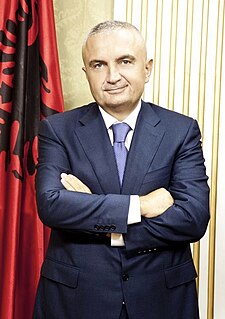
The President of the Republic of Liberia is the head of state and government of Liberia. The president serves as the leader of the executive branch and as commander-in-chief of the Armed Forces of Liberia.
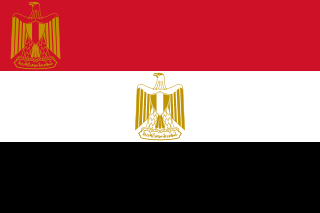
The President of the Arab Republic of Egypt is the head of state of Egypt. Under the various iterations of the Constitution of Egypt, the president is also the Supreme Commander of the Armed Forces and head of the executive branch of the Egyptian government. The current president is Abdel Fattah el-Sisi, in office since 8 June 2014.

The President of the Czech Republic is the elected formal head of state of the Czech Republic and the commander-in-chief of the Military of the Czech Republic. Unlike counterparts in other Central European countries such as Austria and Hungary, who are generally considered figureheads, the Czech president has a considerable role in political affairs. Because many powers can only be exercised with the signatures of both the President and the Prime Minister of the Czech Republic, responsibility over some political issues is effectively shared between the two offices.
The Federal Convention, also known as the Federal Assembly, is a special constitutional body in the political and federal institutional system of Germany, convened solely for the purpose of electing the President of the Federal Republic of Germany (Bundespräsident), either every five years or within 30 days of the premature termination of a presidential term. The Federal Convention mirrors the aggregated majority situation of the Bundestag and the parliaments of the 16 German federal states.
A presidential election is the election of any head of state whose official title is President.

Elections in Benin take place within the framework of a multi-party democracy and a presidential system. Both the President and the National Assembly are directly elected by voters, with elections organised by the Autonomous National Electoral Commission (CENA).

Elections in Lithuania gives information on elections and election results in Lithuania.

The 2007 Turkish presidential election refers to two attempts to elect the country's 11th president, to succeed Ahmet Necdet Sezer. The most likely candidate for president was Abdullah Gül. Turkey's presidential office is regarded as the guardian of the country's secular system; the fact that Gül's wife wears the Islamic headscarf, as well as his own history in political Islam, turned the elections into a political crisis.
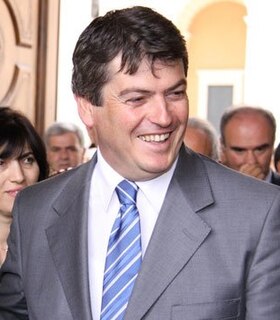
Indirect presidential elections were held in Albania on 20 and 27 June, 8, 11, 14, and 20 July, the sixth such elections since the collapse of the communist regime in 1991.
Indirect presidential elections were held in Albania on 24 June 2002, the fifth such elections since the collapse of the communist regime in 1991. Under pressure from international organization, Alfred Moisiu was chosen by Sali Berisha and Fatos Nano as a consensus candidate for the presidency after the end of Rexhep Meidani's term. Moisiu was found fitting for that post since he was a researcher, was politically neutral, was known as an effective mediator and had a decisive pro-Western and NATO orientation.
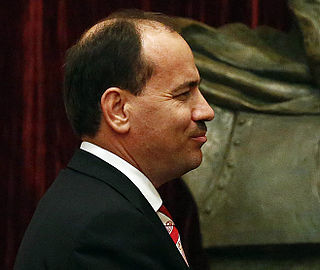
Indirect presidential elections were held in Albania on 30 May, 4, 8 and 11 June 2012. the seventh such elections since the collapse of the communist regime in 1991. The first through third rounds of voting were inconclusive. The fourth round resulted in the incumbent party's member Bujar Nishani being elected as President.
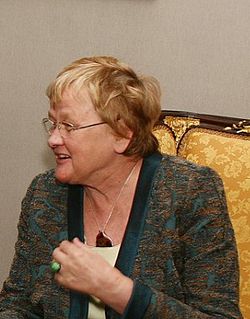
Estonian presidential elections, 2006 took place over four rounds, which were held on 28 and 29 August, and 23 September 2006. The first three rounds of the presidential election were held within the Riigikogu, which is Estonia's Parliament, as specified under electoral law. The two top candidates, Ene Ergma and Toomas Hendrik Ilves, were not elected because they did not obtain the required two-thirds of the votes in the Riigikogu.

The next elections for the President of Croatia are due to take place by direct popular vote on a date between 21 December 2019 and 20 January 2020, with a second round to take place on a date between 4 January 2020 and 3 February 2020 between the two candidates with the largest number of votes in the first round. Namely, the Constitution of Croatia states that a presidential election must be held no more than 60 days and no less than 30 days before the expiration of the incumbent president's term. They will be the seventh presidential elections since the first direct ones were held in 1992.

Indirect presidential elections were held in Greece in December 2014 and February 2015 for the succession to Karolos Papoulias as the President of Greece. The candidate of the ND–PASOK government, Stavros Dimas, failed to secure the required majority of MPs of the Hellenic Parliament in the first three rounds of voting in December. According to the provisions of the Greek Constitution, snap elections were held on 25 January 2015, which were won by the far-left SYRIZA party. Following the convening of the new parliament, the presidential election resumed, and on 18 February 2015, veteran ND politician Prokopis Pavlopoulos, backed by the SYRIZA-ANEL coalition government, was elected with 233 votes.

The 2020 United States elections will be held on Tuesday, November 3, 2020. All 435 seats in the United States House of Representatives, 34 of the 100 seats in the United States Senate, and the office of President of the United States will be contested. Thirteen state and territorial governorships, as well as numerous other state and local elections, will also be contested.

The 1998 Czech presidential election took place on 20 January 1998 to elect a new President of the Czech Republic. The Parliament of the Czech Republic elected the president on the second round. Václav Havel was reelected President. The election is linked with controversial arrest of an opposition candidate Miroslav Sládek which was criticised by Havel's opponents.
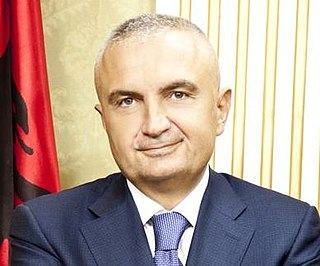
Indirect presidential elections were held in Albania on 19, 20, 27 and 28 April 2017, the eighth such elections since the collapse of the communist regime in 1991. In the first through third round, no candidates were proposed and no vote took place in the Parliament of Albania. In the fourth round, the incumbent Chairperson and then-Prime Minister of Albania, Ilir Meta was elected as the eighth President of Albania with almost 87 votes.
The first round of the 2022 French presidential election will be held between 8 and 23 April 2022, with the second round held two weeks after the first. Should no candidate win a majority of the vote in the first round, a runoff will be held between the top two candidates two weeks later. The incumbent president is Emmanuel Macron of La République En Marche!, who won the 2017 presidential election and whose term lasts until 13 May 2022.
Indirect presidential elections will be held in Kosovo in 2021, with a first, second or third round if necessary. The constitution states that the presidential election must be held 30 days before the end of the current president's term. They will be the fifth presidential elections.


